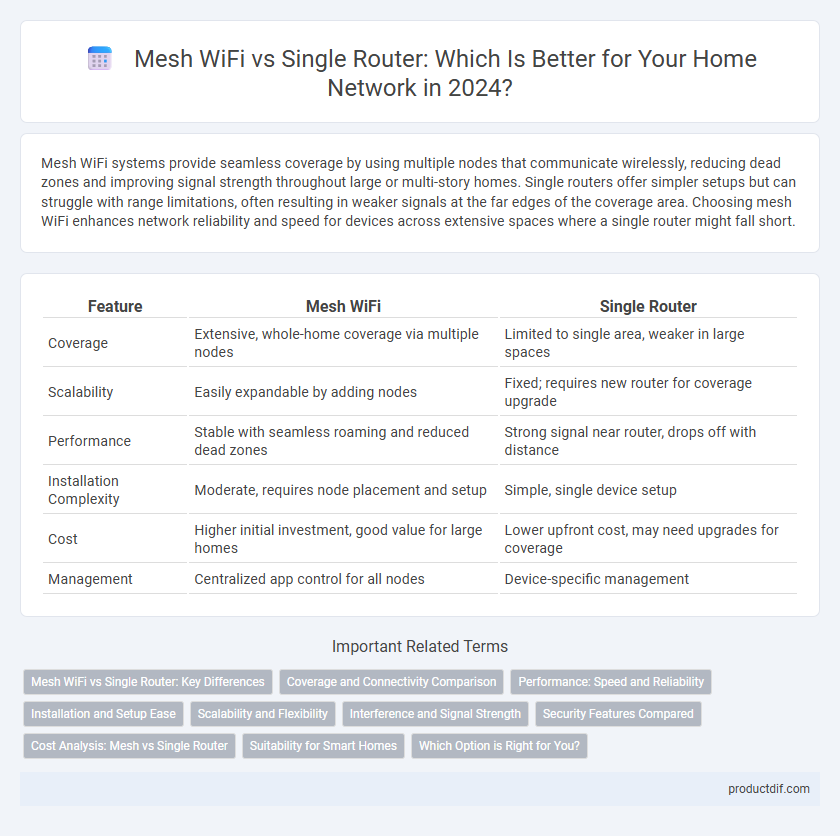Mesh WiFi systems provide seamless coverage by using multiple nodes that communicate wirelessly, reducing dead zones and improving signal strength throughout large or multi-story homes. Single routers offer simpler setups but can struggle with range limitations, often resulting in weaker signals at the far edges of the coverage area. Choosing mesh WiFi enhances network reliability and speed for devices across extensive spaces where a single router might fall short.
Table of Comparison
| Feature | Mesh WiFi | Single Router |
|---|---|---|
| Coverage | Extensive, whole-home coverage via multiple nodes | Limited to single area, weaker in large spaces |
| Scalability | Easily expandable by adding nodes | Fixed; requires new router for coverage upgrade |
| Performance | Stable with seamless roaming and reduced dead zones | Strong signal near router, drops off with distance |
| Installation Complexity | Moderate, requires node placement and setup | Simple, single device setup |
| Cost | Higher initial investment, good value for large homes | Lower upfront cost, may need upgrades for coverage |
| Management | Centralized app control for all nodes | Device-specific management |
Mesh WiFi vs Single Router: Key Differences
Mesh WiFi systems consist of multiple nodes working together to provide seamless wireless coverage across large areas, eliminating dead zones often found with single routers. Single routers rely on a single device to transmit signals, which can result in weaker connectivity as distance and obstacles increase. Mesh WiFi offers enhanced scalability and consistent speeds, making it ideal for large homes or offices, whereas single routers are generally more cost-effective for smaller spaces with straightforward layouts.
Coverage and Connectivity Comparison
Mesh WiFi systems provide superior coverage by using multiple nodes that communicate to eliminate dead zones, ideal for large homes or spaces with complex layouts. Single routers offer strong connectivity within a limited range but often struggle with signal drops and weak spots in distant or obstructed areas. Mesh networks ensure seamless connectivity by automatically routing data through the optimal node, improving overall network stability and performance compared to standalone routers.
Performance: Speed and Reliability
Mesh WiFi systems deliver superior speed and reliability by using multiple interconnected nodes that eliminate dead zones and balance device load, ensuring consistent high-speed coverage throughout large or multi-story homes. Single routers often struggle with signal degradation and congestion when covering extensive areas or numerous devices, resulting in slower speeds and reduced reliability. For optimal network performance, especially in environments with many connected devices or challenging layouts, mesh WiFi outperforms traditional single-router setups.
Installation and Setup Ease
Mesh WiFi systems offer straightforward installation through intuitive mobile apps that guide users step-by-step, enabling seamless expansion of coverage by simply adding nodes. Single routers typically require manual configuration of settings like SSID and password, which can be complex for non-technical users. Mesh networks eliminate dead zones with effortless setup, while single routers may need additional range extenders or wired access points for broader coverage.
Scalability and Flexibility
Mesh WiFi systems offer superior scalability by allowing multiple nodes to seamlessly expand network coverage across large areas without degradation in performance. Unlike single routers that often struggle with dead zones and limited range, mesh networks provide flexible placement options to optimize connectivity based on user needs and environmental factors. This adaptability ensures consistent high-speed connections and easy integration of new devices, making mesh WiFi ideal for growing or complex home and office environments.
Interference and Signal Strength
Mesh WiFi systems minimize interference by using multiple nodes that communicate with each other, creating a seamless network with strong signal strength throughout large areas. Single routers often struggle with signal degradation and interference, especially in homes with thick walls or multiple electronic devices competing on the same frequency bands. Mesh networks dynamically optimize connections to reduce dead zones and maintain higher overall signal quality compared to traditional single router setups.
Security Features Compared
Mesh WiFi systems offer enhanced security features by continuously updating firmware automatically across all nodes, reducing vulnerabilities compared to single routers with manual updates. Advanced encryption protocols like WPA3 are standard in most mesh networks, providing stronger protection against cyber threats. The distributed architecture of mesh WiFi limits the risk of total network compromise, while single routers create a single point of failure that attackers can exploit.
Cost Analysis: Mesh vs Single Router
Mesh WiFi systems typically incur higher upfront costs due to the multiple nodes required for optimal coverage, whereas single routers are more affordable with a one-time purchase. However, mesh WiFi offers scalable network expansion and improved performance in larger homes, potentially reducing the need for additional extenders or repeaters that single routers may require. Long-term cost efficiency depends on home size, internet usage, and the necessity for seamless connectivity throughout multiple rooms or floors.
Suitability for Smart Homes
Mesh WiFi systems offer superior coverage and seamless connectivity across large smart homes with numerous IoT devices, reducing dead zones and ensuring consistent signal strength in every room. Single routers may suffice for smaller homes with fewer connected devices but often struggle to support multiple smart gadgets simultaneously, leading to network congestion and inconsistent performance. For smart homes with extensive automation and multiple users, mesh WiFi provides scalable, reliable connectivity ideal for maintaining smooth device communication.
Which Option is Right for You?
Mesh WiFi systems provide extensive coverage and seamless connectivity across large homes or offices by using multiple nodes that communicate to eliminate dead zones, while single routers offer a more straightforward, cost-effective solution suitable for smaller spaces with limited device demand. Factors such as the size of the area, number of connected devices, internet speed requirements, and budget should guide the decision between mesh WiFi and single router setups. Users with expansive properties or complex layouts benefit from mesh networks, whereas single routers suffice for compact environments with moderate wireless needs.
Mesh WiFi vs Single Router Infographic

 productdif.com
productdif.com